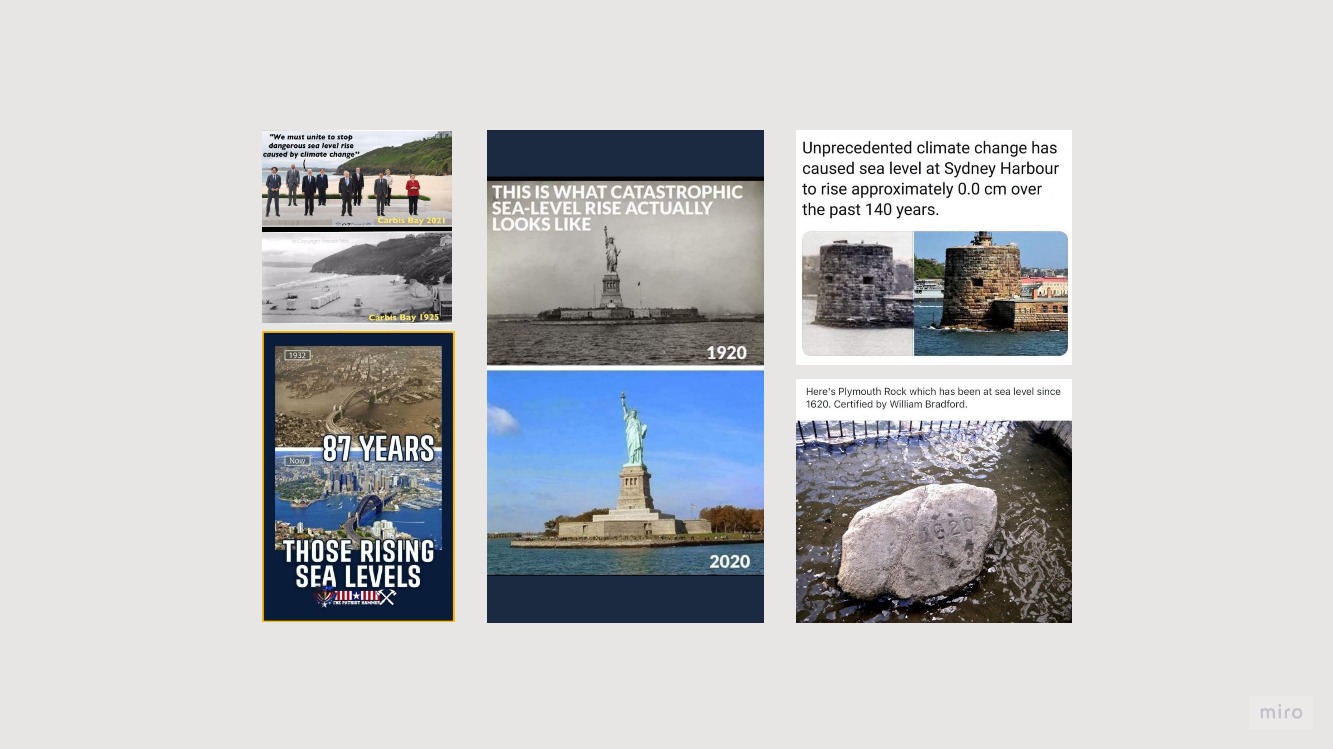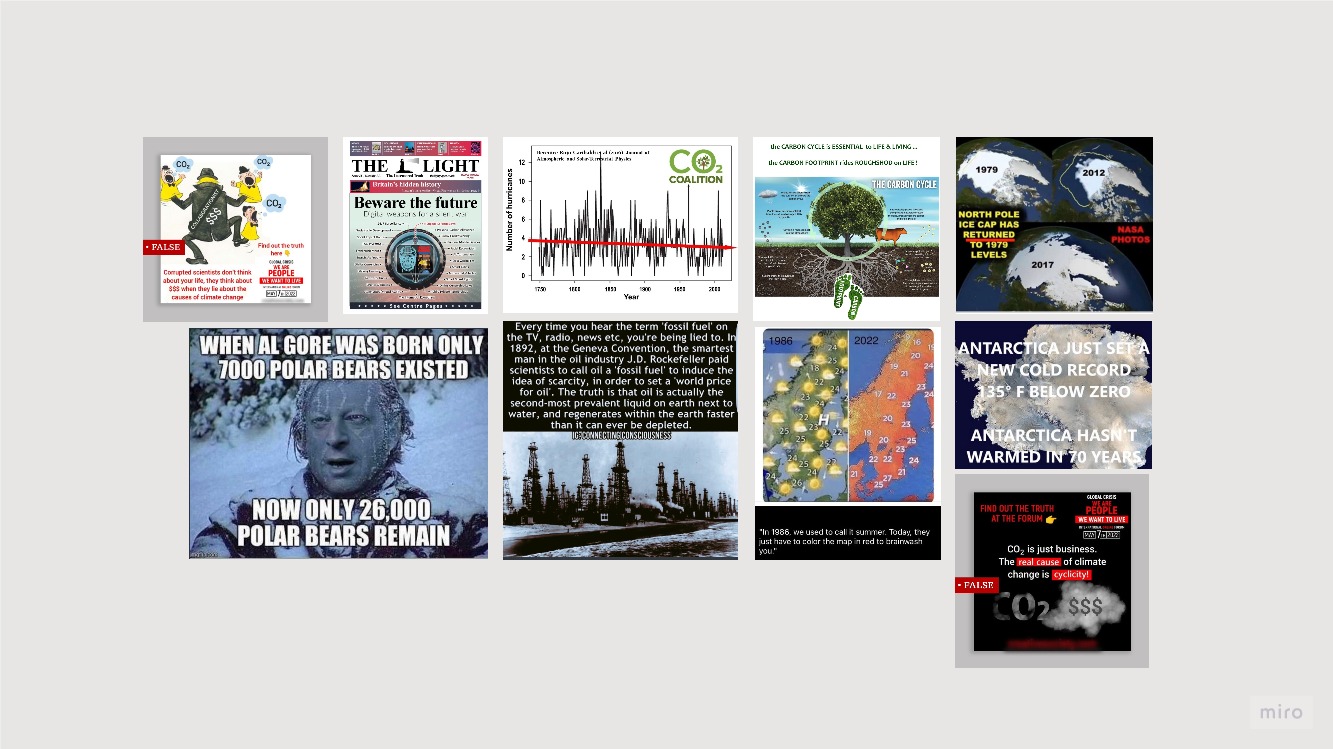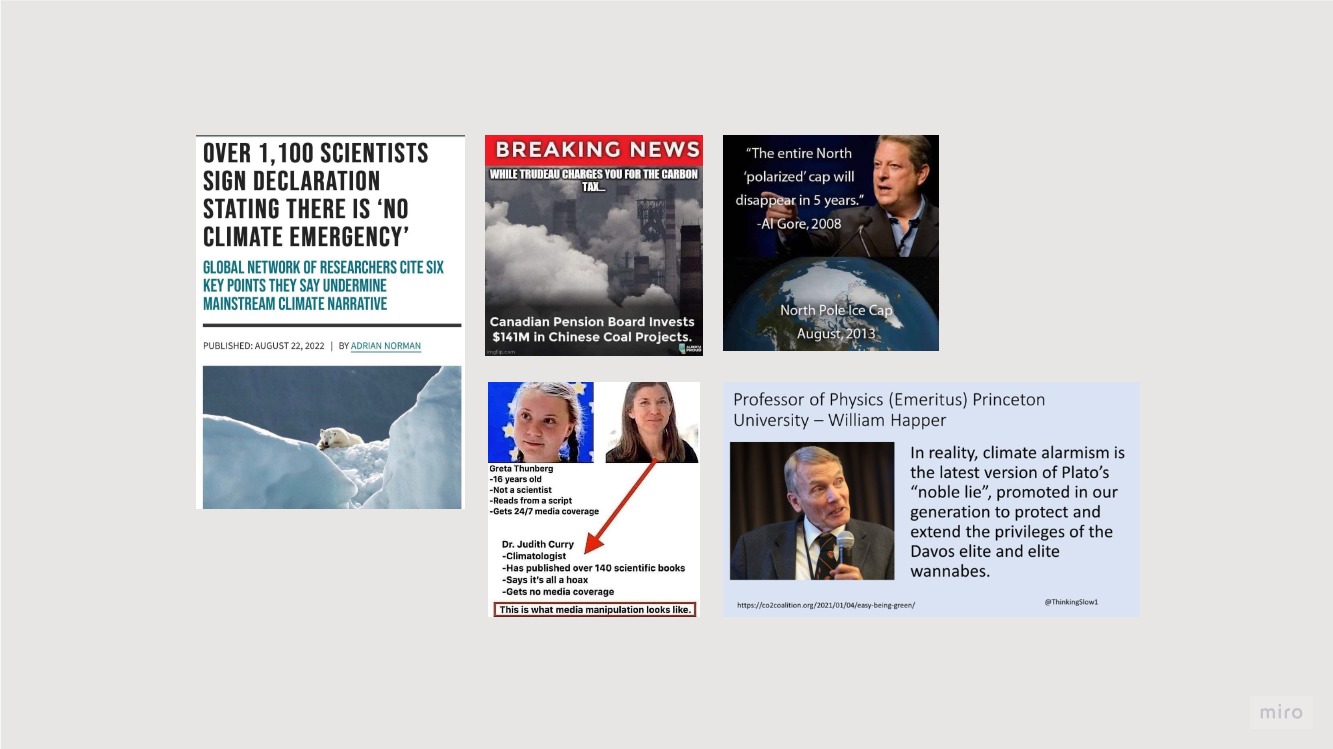- Week 8
- Project Week

1. Research
"Internet Memes: Leaflet Propaganda of the Digital Age" — Joshua Nieubuurt
After the consultation last week, I decided to take time and trace what climate deniers are doing in the online world. I ask myself, what platform would opiniated people use to spead their nonsense? And so I started browsing twitter.
Below are some of the artefacts I gathered from Twitter which were unsurprisingly (or surprisingly?) mostly in forms of low quality memes. I tried to organize the memes in terms of HOW they are trying to argue about the climate hoax.
Some more content.
Category 1 — Photographical 'evidence'
This collection uses old pictures of objects or monuments near the sea and compare it with a more recently taken photo to show that the sea level hasn't at all.
Category 2 — Scientific 'Facts'
This collection manipulates data and scientific facts to 'prove' that climate change is a hoax. An example is a meme that argues that carbon footprints are not harmful because carbon is an essential part of life. An illustration of the carbon cycle is attached under it — and strategically missing from the cycle are humans..almost as if its actually self-confirming that people are the problem.
Category 3 — Scientists and News
This collection tries to name drop or cite scientists who (to some extent) don't agree on the scientific consensus on climate change as well as extracting news articles. After looking at everything, I started to wonder where do these people get their information from?
Websites
Website made by the SPN ( State Policy Network) that is filled with false statements about climate change
A spin-off from an official website. Follows similar branding and wording
→ My Climate Pledge(1) Microscale Approach
In my opinion, a microscale scope (personal, local, regional coverage) would allow the interaction or the message to have a stronger impact on its target audience because it is in the context of something so close to them.
(3) Personal / Places of Passage Context
Targetting individuals to persuade self-reflection, or in public spaces to encourage public discussion and collective-reflection. Will need to clarify the specificities soon.
Thoughts
Looking at the artefacts, I was hoping to find a specific angle that design & technology could come to play. The aim was to get a deeper understanding on why people are convinced about the climate hoax. Besides the issue of psychological distance, I realized that it's just the nature of the online environment being saturated with misinformation that its becoming hard to differentiate which is true or not without extensive background reasearch that no one has the time to do. Internet memes are a ubiquitous source of light entertainment, yet, why are they taken as geniuine sources of information at times? Does the mix of sarcasm and reality make them objects of truth? Is it because people believe any shocking news they see? Or ss it just that some people have not grown out of the habit of believing everything they see in the internet? One perspective put forward by Joshua Nieubuurt, an Adjunct Professor who studies misinformation and disinformation at the University of Okinawa in Japan, is that memes can be regarded as a modern digital equivalent of the propaganda leaflet.
Some footnotes: Lorem ipsum dolor sit amet, consectetur adipiscing elit. Pellentesque est ante, blandit quis massa faucibus, pharetra tincidunt lectus. Suspendisse ut magna blandit justo ornare laoreet. Quisque diam velit, aliquet efficitur ipsum eget, scelerisque semper nunc. Suspendisse pellentesque odio sapien.
Questions
Core Problem? Gap? Investigating the pairing of image and text that influences perception? Experiment Idea: How can our 5 senses potentially bridge the experienced psychological distance of climate change? What would touch be? What would Smell/Hear/See/Taste be? Sketch small Side Idea: Impact of Tonality in climate change messaging? Visual heavy, but where does tech come to play?
Some footnotes: Lorem ipsum dolor sit amet, consectetur adipiscing elit. Pellentesque est ante, blandit quis massa faucibus, pharetra tincidunt lectus. Suspendisse ut magna blandit justo ornare laoreet. Quisque diam velit, aliquet efficitur ipsum eget, scelerisque semper nunc. Suspendisse pellentesque odio sapien.
Readings
Some footnotes: Lorem ipsum dolor sit amet, consectetur adipiscing elit. Pellentesque est ante, blandit quis massa faucibus, pharetra tincidunt lectus. Suspendisse ut magna blandit justo ornare laoreet. Quisque diam velit, aliquet efficitur ipsum eget, scelerisque semper nunc. Suspendisse pellentesque odio sapien.
Consultation with Yasser
Explain what he said, Thoughts At first I was hesitant to have Indonesia specific target audience because I kind of thought that because my intervention would probably be something tech-y, and because the people impacted by climate change would definitely be vulnerable communities in rural areas of jakarta, it would be to get user testing, especially with the Covid situation there not improving. I remember voicing this worry to Andreas in Week 2/3, and he said I shouldn't worry about it right now, and in hindsight, I should've listened!
Some footnotes: Lorem ipsum dolor sit amet, consectetur adipiscing elit. Pellentesque est ante, blandit quis massa faucibus, pharetra tincidunt lectus. Suspendisse ut magna blandit justo ornare laoreet. Quisque diam velit, aliquet efficitur ipsum eget, scelerisque semper nunc. Suspendisse pellentesque odio sapien.
RPO
Pillars, Explanation, Reflecting on Gaps
Some footnotes: Lorem ipsum dolor sit amet, consectetur adipiscing elit. Pellentesque est ante, blandit quis massa faucibus, pharetra tincidunt lectus. Suspendisse ut magna blandit justo ornare laoreet. Quisque diam velit, aliquet efficitur ipsum eget, scelerisque semper nunc. Suspendisse pellentesque odio sapien.


